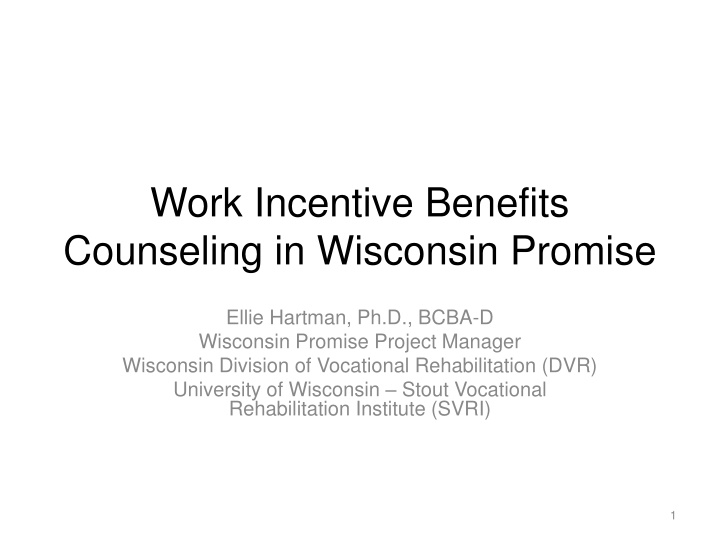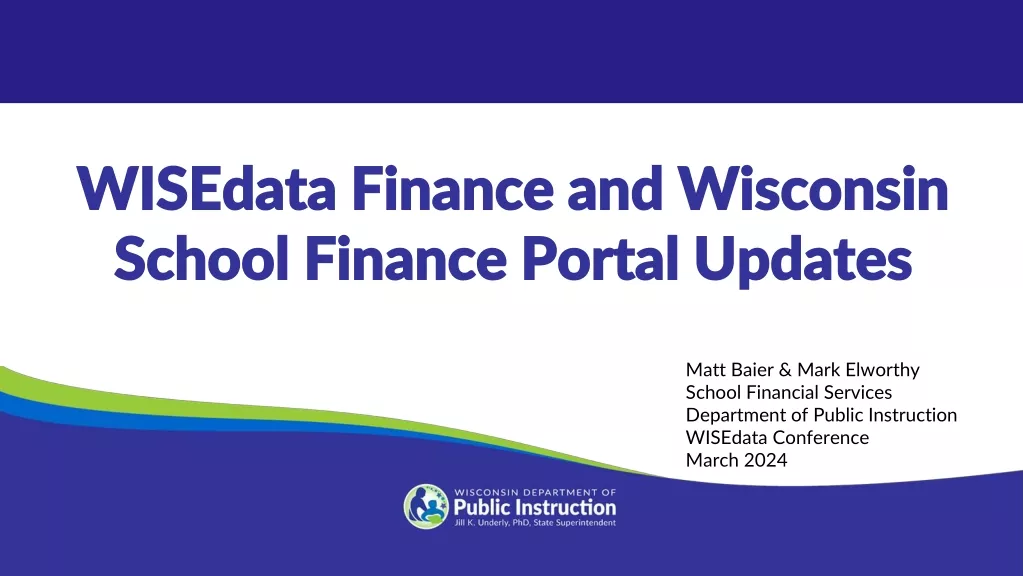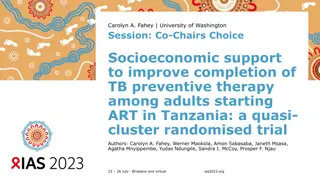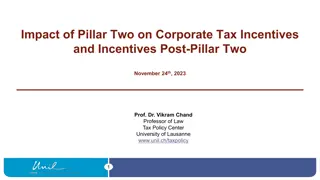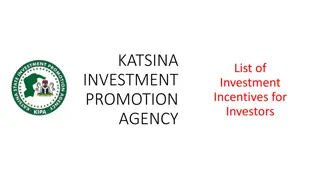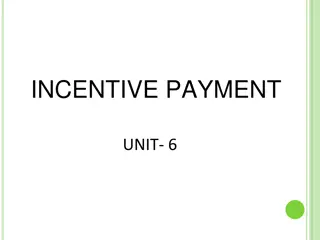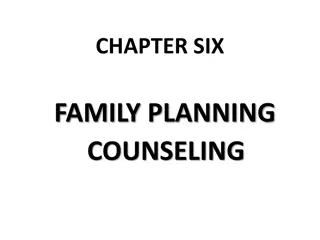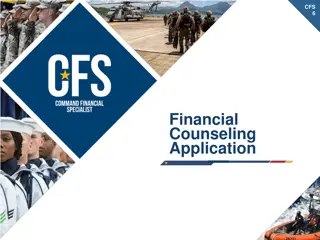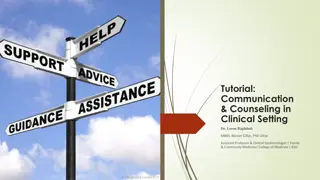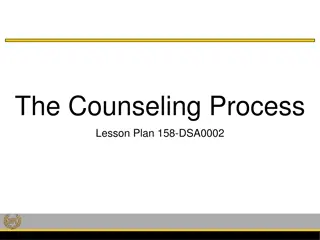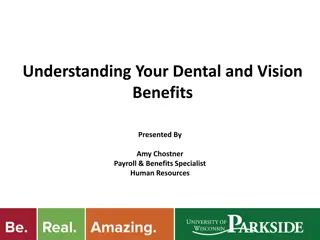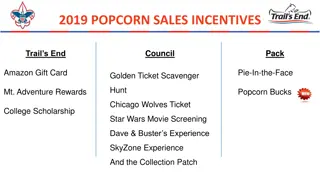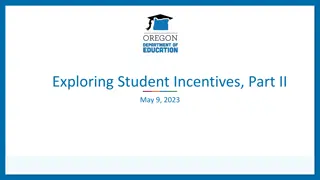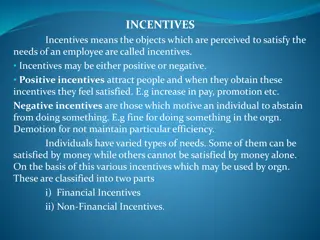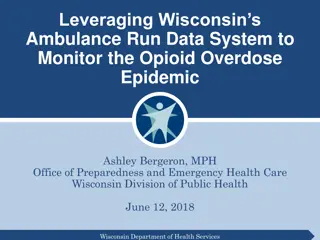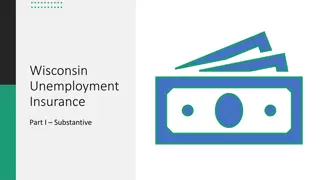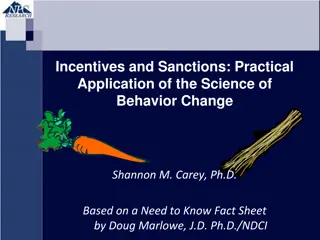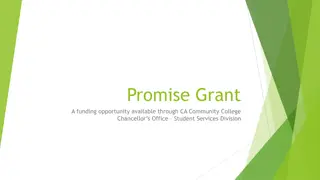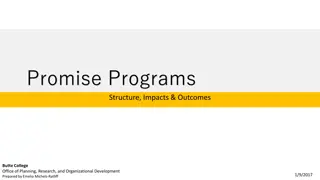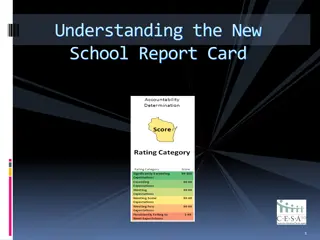Benefits Counseling for Work Incentives in Wisconsin Promise Project
Work Incentive Benefits Counseling plays a crucial role in improving employment outcomes in Wisconsin's Promise project. The counseling helps individuals understand benefits, utilize work incentives correctly, and navigate local SSA resources. The project focuses on providing information to families, supporting youth in understanding work-related benefits and expenses, and maximizing opportunities for employment through various benefits programs.
Download Presentation

Please find below an Image/Link to download the presentation.
The content on the website is provided AS IS for your information and personal use only. It may not be sold, licensed, or shared on other websites without obtaining consent from the author.If you encounter any issues during the download, it is possible that the publisher has removed the file from their server.
You are allowed to download the files provided on this website for personal or commercial use, subject to the condition that they are used lawfully. All files are the property of their respective owners.
The content on the website is provided AS IS for your information and personal use only. It may not be sold, licensed, or shared on other websites without obtaining consent from the author.
E N D
Presentation Transcript
Work Incentive Benefits Counseling in Wisconsin Promise Ellie Hartman, Ph.D., BCBA-D Wisconsin Promise Project Manager Wisconsin Division of Vocational Rehabilitation (DVR) University of Wisconsin Stout Vocational Rehabilitation Institute (SVRI) 1
Benefits Counseling Improves Work Incentives Wisconsin Benefit Offset Pilot Benefits Counseling is the largest predictor of employment outcomes. Delin, B.S., Hartman, E.C., & Sell, C.W. (2012). The impact of work incentive benefits counseling on employment outcomes: Evidence from two return-to- work demonstrations. Journal of Vocational Rehabilitation, 36, 97-107. Benefits Counseling is important: Helps people understand benefits and use work incentives Ensures work incentives are implemented correctly (overpayment issues) Highlights importance of the local Social Security Administration (SSA) and Area Work Incentive Coordinator (AWIC) 2
Benefits Counseling for Youth Wisconsin Let s Get to Work Grant Lessons Learned: Different approach needed for youth Connecting to Work Incentives Benefits Specialist Impact of a Benefits Analysis http://www.letsgettoworkwi.org/ 3
Wisconsin Promise Introduction of the benefits consult Provide information as needed/wanted; Meet families where they are Youth starting to think about and/or trying work - Student Earned Income Exclusion (SEIE) and Impairment Related Work Expenses (IRWEs) Deeming/reporting work activity (child care payments; parents starting or increasing work) Medical reviews and 18-year redeterminations: Section 301 Local Benefits Medicaid; FoodShare; housing Asset Limits; ABLE Accounts 4
Wisconsin Promise Resources/ Short Fact Sheets https://promisewi.com/benefits-resources/ 5
Wisconsin Promise Youth Service Data 455 Promise youth/families met with a Benefit Specialist 438 Youth: 423 Consults; 25 Analyses Average 4.6 hours per consult Average 1.13 travel hours and 0.14 no show hours Average 4.3 hours per analysis 173,or 39 percent, of youth using work incentives 149 youth: SEIE 58 youth applied for Section 301 23 youth currently approved for Section 301 by SSA 6
Wisconsin Promise Family Service Data 30 Household Members: 17 Consults; 18 Analyses Average 5 hours per consult Average 1.52 travel hours and 0.23 no show hours Average 9 hours per analysis 15, or 50 percent, of Promise family members using or used work incentives 8 family members: Earned Income Exclusion 8 family members: Medicaid while working 5 family members: Earned Income Tax Credit 5 family members: IRWEs 5 family members: SEIE 4 family members: Ticket to Work 7
Wisconsin Promise: Benefits Counseling and Employment Youth who met with a Wisconsin Promise Benefits Specialist Have Had Twice as Many Jobs 455 Youth (N = 455) met with a Benefits Specialist 314 worked 564 different jobs Average 32 hours per week; median 23 hours per week Weekly Average of $267.88 per youth, median $187.50 557 Youth have NOT met with a Benefits Specialist 176 worked 280 different jobs Average 31 hours per week, median 20 hours per week Weekly Average of $254.49 per youth, median $181.00 Of the 34 Youth earning more than Substantial Gainful Activity (SGA): 22 have met at least once with a Benefits Specialist 12 have not met with a Benefits Specialist 8
Adding Financial Literacy/Coaching to Benefits Counseling Monthly budgets: savings/spending plan Needs vs. wants Paying off debt; negotiating a payment plan Banking vs. payday loans (and the like) Building credit, assets, and investing Connecting to Individual Development Accounts (IDAs) 131 Wisconsin Promise Youth IDAs 86 Wisconsin Promise Family Member IDAs 9
Recommendations from Wisconsin Promise Benefits Specialists Here s my dream model for benefits counseling brief overview benefits counseling before someone works with regular check-ins as the person prepares for work, during work to make sure that the reporting requirements are managed, and then as needed after work is established with less frequent check-ins. The initial regular check-ins would be to reassure the person that the information is true. That is definitely where people start to doubt that they can work and have enough money. 10
